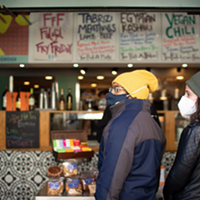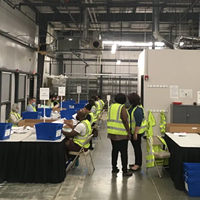Wrapped up in House Bill 589 — otherwise known as North Carolina's pesky voter-ID bill — was a decision that has changed for the worse the process of electing judges and how those judges rule from the bench.
Last year's House Bill 589 killed the N.C. Public Campaign Fund, which gave judges access to public campaign grants if they abided by certain spending and fundraising limits. The fund began in 2004 as a way to keep lawyers and businesses from donating to a judge they might one day see in court. And the system worked, by all accounts. A vast majority of candidates opted for the public grants, funded by attorneys fees and a small, $3-donation box on state income tax forms. As Democracy NC points out, donations from attorneys and special interest groups fell from 73 percent of total donations before the program to 14 percent after it started.
So why was it repealed? Bert Brandenburg, executive director of Justice at Stake, a Washington D.C.-based nonpartisan group working to keep courts impartial, says Republicans abolished a similar system in Wisconsin when they took over.
"People who went after the system saw it as getting in their way because it was successfully insulating judges from political pressure," Brandenburg says. "For a lot of people, politics is a blood sport, and for a lot of those people judicial politics isn't different than other politics. Basically, anything you can do anywhere to increase your chances of getting your way is fair game. Of course, that's terrible constitutional policy."
Now to raise money, judges campaign like politicians, going door to door asking lawyers and others for handouts instead of receiving public money and relatively small but numerous donations from voters.
Americans have elected judges for the better half of two centuries, but the process has changed in the last decade and a half, Brandenburg says, thanks, in part, to the U.S. Supreme Court's 2010 Citizens United ruling, which allowed more outside spending on campaigns.
"They [judicial elections] used to be a lot quieter, a lot less costly. Now, instead, you have this circus that judges have to perform in and go back to their day jobs. We're increasingly pressuring our judges to act like Huey Long on the campaign trail and turn around and be Solomon in the courtroom."
In this year's election North Carolina voters will select a handful of appellate and Supreme Court judges — including the Supreme Court's chief justice. Mecklenburg County will select two district court judges; the superior court race is unopposed now that contender Justin Moore has left the race, but his name remains on the ballot. Lawyers groups support the incumbents in the local races.
Comprised of 15 judges who hear cases in panels of three, the Court of Appeals reviews the proceedings of trial courts for legal errors, and the Supreme Court is, of course, the state's highest court, comprised of six associate justices and one chief justice. The races are supposed to be nonpartisan, in that you won't see a judge's party affiliation next to his or her name on the ballot. But after Citizens United, political groups started dumping millions into attack ads — most if not all against so-called "soft-on-crime" Democrats — that a recent study shows ultimately affects the way judges rule.
According to "Skewed Justice," a report the American Constitution Society for Law and Policy released in late October, "the more TV ads aired during state supreme court judicial elections in a state, the less likely justices are to vote in favor of criminal defendants."
In 2012, political and special-interest group spending on such TV ads hit $24 million, an all-time high, according to the Brennan Center for Justice and Justice at Stake. As of Oct. 7, the Brennan Center estimates candidates for the North Carolina Supreme Court booked $1 million worth of campaign ads.
The relatively low-profile rhetoric of most judicial elections got significantly louder this year when Ola Mae Lewis, a long-standing trial judge from eastern North Carolina, challenged Mark Martin for the state's Supreme Court justice seat, even though Lewis entered the race with a soft thud. At one event, an announcer didn't mention her as Martin's opponent because he didn't know Martin had one.
But that didn't last long. In April, at the Republican Party's 5th Congressional District convention in North Wilkesboro — like Lewis, Martin is also a Republican, appointed in August by Gov. McCrory to take over for the retiring Supreme Court justice — Lewis attacked her opponent's work ethic, saying the 15-year senior associate justice on the court had only written five opinions in 2013. Martin countered by attacking Lewis's lack of experience on the Supreme Court. "Saying there's a steep learning curve for chief justice, Martin responded to Lewis' charge about productivity. He said for the past two years he was 'at the top of opinions issued' and said he wrote hundreds of legal memorandums about whether to take cases, a point Lewis excluded," Raleigh's News & Observer reported. Martin has his party's support as well as the backing of the state superintendent. Progressive groups also endorse the moderate Republican. Lewis, who has openly campaigned for Republicans and made an appearance on Fox News to talk about black Republicans, hasn't received nearly as much support.
If voter turnout in elections is traditionally low, it's especially low in judicial races. Even voters who take to the polls consistently will glaze over judicial candidates on ballots, in part because the races have been historically low-key, but also because it's hard to vet a judge — especially when there are more than the traditional two or three going for a seat. (Nineteen candidates are vying for one of the four appellate seats up for grabs in this year, including John Arrowood, a local attorney who seems to be the favorite.)
Some states offer wholistic reviews of candidates called judicial performance evaluations (JPEs for short). Everyone from an attorney to a court staffer is polled on his or her opinion of a judge. In other states, including North Carolina, the bar association polls lawyers on judicial candidates, not including appellate candidates. In this year's elections, attorneys favor the incumbents.
Ask questions about judicial races and you'll hear the same line: They're not perfect. In states that hold partisan races, judges who belong to the party not in control of the state legislature often don't stand a chance.
"There's no way around the fact that judicial elections on a good day is a complicated thing," Brandenburg says. "Any system you set up is going to be imperfect and sometimes deeply imperfect."
Speaking of...
Latest in News Feature
More by Ana McKenzie
Calendar
-
 Cirque du Soleil: OVO @ Bojangles' Coliseum
Cirque du Soleil: OVO @ Bojangles' Coliseum -

Coveted Luxury Watches
-

TheDiscountCodes
-

Queen City R&B Festival & Day Party @ Blush CLT
-

R&B Music Bingo + Comedy Show @ Blush CLT














